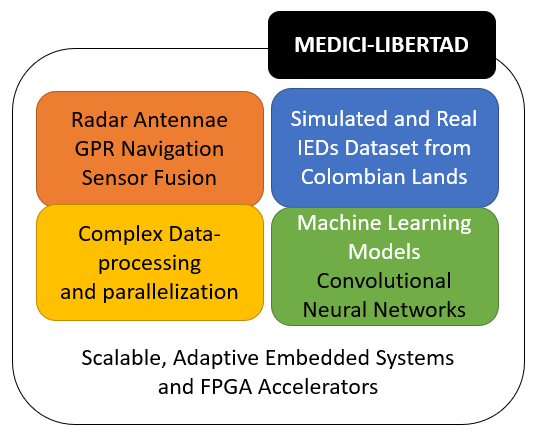MEDICI-LIBERTAD
MEDICI - LIBERTAD: Simulator Driven Machine Learning on Embedded Systems for GPR Navigation and IED Detection
Decades of guerilla warfare in Colombia have left behind a deadly legacy of thousands of landmines. The country is still peppered with landmines from the armed conflict with the guerilleros. The statistics are horrifying: over 10,000 people have been injured or killed by landmines in the last 15 years. According to the international Landmine Monitor 2016 and 2017, this puts Colombia in sixth place in the casualty statistics, and with up to 99 square kilometers of the country being mined, it is still classified as “heavily minecontaminated”. A problem within a problem itself is the Improvised Explosive Devices (IED Landmines) which are harder to detect using the conventional methodologies and sensing systems. Such IEDs need to be detected/classified and hence should be subjected to safe removals after detection, but the first problem remains detection and classification.
Under the light of this problem, researchers from BTU Cottbus - Senftenberg, RUB - Bochum, Universidad Nacional de Colombia and TU Ilmenau joined hands together with DFG - German Research Foundation to plan and put up this project. MEDICI-LIBERTAD deals with the demining activities on Colombian Land by exploiting modern technology. It offers radar based sensing system to detect mines along with sensor-fusion concept for its navigation over a demining area. The system must be realized on complex embedded systems which is capable of running state-of-the-art AI and Machine Learning Algorithms to detect and classify mines while succesfully differentiating it from clutter objects in the ground.

MEDICI - HUMANITARIAN MICROWAVE DETECTION OF IMPROVISED EXPLOSIVE DEVICES
A project prior to the MEDICI-LIBERTAD dealt with the exploration of radar based sensing system to detect, identify and classify buried undetected IEDs. This project was mostly focused on development of radar based antennae systems with off-the-shelf data processing systems. Moreover, a relatively conventional way of classification using Support Vector Machines (SVMs) was used on the dataset simulated and generated for IEDs buried in the ground. This new project MEDICI-LIBERTAD offers great improvements and further fine-tuning of the current sensing system by involving Embedded Systems and Simulator Driven Datasets for State-of-the-Art Machine Learning Algorithms and Neural Networks.

The word Libertad from Spanish means "Freedom" and has been abbreviated from the project title marked with bold letters: Simulator Driven Machine Learning on Embedded Systems for GPR Navigation ad IED Detection. As the name suggests, this project is based on simulator driven data which eventually is used to train our Machine Learning Algorithms and Neural Networks such as CNNs, the models should be able to run on a complex embedded system capable of capturing data and processing it while doing IED classification simultaneously. As an improvement to its predecessor project; MEDICI-LIBERTAD has following objectives and must cater a range of engineering and reasearch challenges:
- Simulator based dataset generation
- Design of Machine Learning Models to be able to classify IEDs as well as Ground Clutter
- Improvement in Accuracy, Precision and Recall upto 95% accuracy rate.
- Highly complex, Scalable and adaptive Embedded Systems in order to process data from the Sensing system and be able to run compute intensive Neural Network models.
